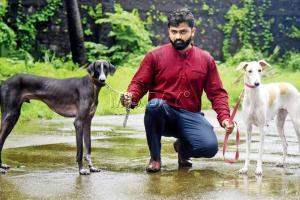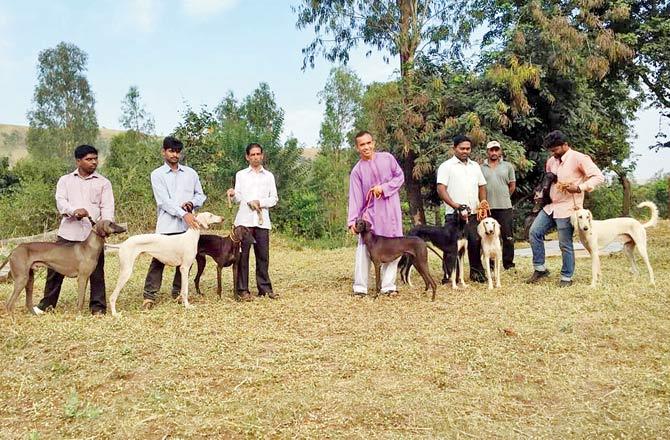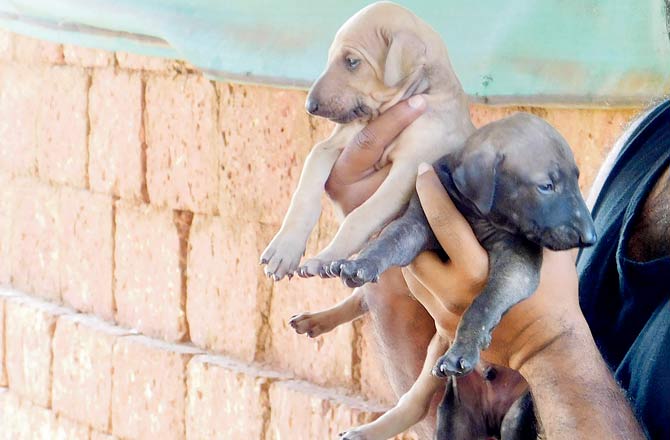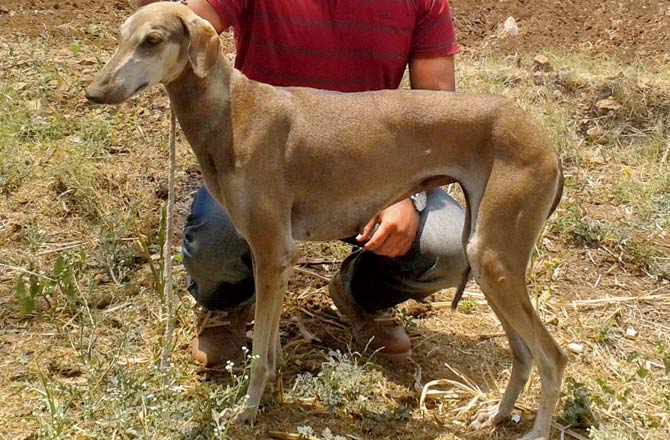An automation engineer, born in Kolhapur and raised in Mumbai, emerges as an ambassador for conservation of Indian dog breeds, particularly the under-recognised native hounds of Maharashtra

Tejas Kamalkar, 27, with two native dogs Guddu - a male Caravan and Amba - a female Alaknoori. Pic/Sameer Markande
 Do it yourself and don't teach me, were the seven angry words, mouthed in 2007 by a dog show breeder that set 16-year-old Tejas Kamalkar on his journey of conserving and breeding native sighthounds. Today, Kamalkar, 27, is not just a proud owner of 40 native dogs in his hometown Kolhapur and four in Mumbai, a foster parent to 56 rehabilitated-adopted dogs of miscellaneous breeds and a quotable authority on breed standard for the Caravan hound. His field research on the differentiation between the Caravan, Mudhol, Pashmi and Alaknoori breeds has been factored in by the Kennel Club of India, published in the Indian Kennel Gazette and also acknowledged by the global canine network Federation Cynologique Internationale.
Do it yourself and don't teach me, were the seven angry words, mouthed in 2007 by a dog show breeder that set 16-year-old Tejas Kamalkar on his journey of conserving and breeding native sighthounds. Today, Kamalkar, 27, is not just a proud owner of 40 native dogs in his hometown Kolhapur and four in Mumbai, a foster parent to 56 rehabilitated-adopted dogs of miscellaneous breeds and a quotable authority on breed standard for the Caravan hound. His field research on the differentiation between the Caravan, Mudhol, Pashmi and Alaknoori breeds has been factored in by the Kennel Club of India, published in the Indian Kennel Gazette and also acknowledged by the global canine network Federation Cynologique Internationale.
When the dog breeder hit out at Kamalkar, the latter was a mere Std XI student armed with only an inherent understanding of purebred dog temperament. He knew the native breeds of Maharashtra — skinny-looking, hardy, fit-for-hunting sighthounds — were rapidly disappearing; they were being adapted to modern-urban habitats and most importantly, they were being crossbred with foreign breeds like Salukis. "I couldn't digest the fact that people wanted the racy ruggedness and resilience of the native breeds, but preferred to superimpose it on a massive impressive built of a foreign breed. The two cannot and should not be desired in a single breed," he says.
ADVERTISEMENT

Tejas Kamalkar with other dog experts in Kohlapur where he keeps 40 dogs of native Indian breeds
He found that cruel and disrespectful. But his feelings needed to be articulated from the right platforms. "Feelings against a malaise matter only when the one articulating them gathers the credentials, and some grey hair, for fighting the good fight. I knew I had to earn the wherewithal," says Kamalkar who shuttles between his Mulund home and the 4,000 square feet kennel off Kolhapur (Gaganbawda Road).
The kennel shares its boundary with the forest reserve in the Panhala taluka, a home to peacocks, monkeys, hares and wild boar. Kamalkar sources his dogs and bitches from the natives and has employed experts to take care of the kennel. He also has a dedicated website for native hounds, not to forget his social media interventions, signature campaigns, YouTube videos directed towards fair dog breeding-branding and upkeep. Much appreciated were his efforts to hold a state-level summit of 50-odd hounds men of Maharashtra, from where came the popular support to the formal recognition of the Caravan hound, and also a united opposition to the inbreeding and cross breeding malpractices.
It was horses that first evoked Kamalkar's interest in dogs. His school vacations took him to the ancestral home in Kolhapur which had an abundance of dogs, cats, sheep, cattle and domesticated horses. He was known for taking care of stray cats and dogs at his Mulund house too. As he started motorcycling into the rugged rocky hunting game lands in Sangli, Solapur, Satara, as well as the adjoining Vijapur, Belgaum and Mudhol (Karnataka), he developed an abiding love for countryside travel. But after losing his father in 2007, he knew that his excursions had to be self-financed.

By serving as a weekend mechanic at a Mira Road garage for three years, a stint which aided him in the mechanical engineering curriculum, Kamalkar continued with his backpacking trips throughout his college life. In one such vacation to Rajasthan, particularly the Pushkar Mela of 2009, he came in contact with horse breeders and handlers (included the royalty which prided on war horses) who were fighting for the upkeep and breeding of native Marwari, Kathiawari and Sindhi horse breeds. Kamalkar was touched by the pride in the endemic fauna; he started scouting for horse owners in Mumbai. "Internet had just entered my life! I started surfing the Orkut and Facebook profiles of these 'warriors' pursuing the 'horse cause'. Their camaraderie over rearing of native horses made me aware of a united world of horse handlers. I thought I could serve the cause of dogs." Soon his online interactions shaped his offline association with native dog owners in the hunting capital of India. He calls it a "calling from the Deccan Plateau" because at a time when his curriculum demanded a focus on physics, he was voraciously reading biology, genetics and canine reproduction.
Kamalkar knew he wanted a life around native dogs, but for this he had to fall back on his engineering skills. In 2013, he opened his workshop, specialising in manufacture of packaging machines for pharma products, in Kalyan. Today, it employs seven tool experts, but at one point it was just a steady source of earning for the launch of Resolute Kennels, his dog conservation project in Kolhapur. The project rests on the insights of the native inhabitants of southern Maharashtra. Kamalkar has purchased the breed from them in a range of Rs 25,000 to Rs 80,000. Of late, he has also sold pups in a range of Rs 15,000 to Rs 1,00,000 in the Indian and foreign market.

With every advancing year, he can sense the growing market acceptability of the native breed, first in term of the sale of pups, also in terms of the championships his dogs have won. His dogs and bitches have done well in canine shows in Kolhapur, Pune, Gadhinglaj, Ooty, Kodaikanal and Mysore. While Shivani won several "best of breed" titles, Caravan hound Abhir did exceptionally well in many shows. Small pups Gulmastaan and his sister Pinky both won several titles at a Hyderabad show in 2017. The biggest win was that of Caravan pup Arundhati who was the best among all breeds from all over India at the KCI-conducted show last year. With every victory in the dog show world, Kamalkar is inching slowly toward his ultimate goal — to gain respectability and market appeal for native dog breeds.
A native dog is a testament to a country's culture and its people. That is the guiding sentiment for Kamalkar. "India has already lost 25 of its total 50-plus native breeds; Maharashtra has lost varieties like Kaikadi and Paner. Dhangari, the shepherd dog is also endangered. We cannot afford to play around with the remaining." He says conserving the native breeds in their prime glory and correct genetic posture is the answer. He says people should feel a sense of responsibility towards the dogs they own, native or otherwise.
While Kamalkar's sole motto is to conserve the indigenous Caravan (Pashmi and Mudhol too) hound in its original phenotype and lineage, he encourages a healthy non-inbred stock by salvaging all available bloodlines. In other words, he takes great care to avoid accidental mating of littermates. "Breeding within bloodlines creates genetic disorders and we, as humans, should avoid the possibility, especially in designated kennels. For instance, if I have 18-odd Caravans in my possession, it is obligatory on my part to scout for suitable Caravan dogs and bitches even if the gene pool is spread across 600 kilometres."
Kamalkar has built a community of around 60-odd Caravan owners (located in a geographical belt ranging from Satara to Kolhapur to Latur, spanning around 300 villages) who respond to each other' call, not just in terms of breeding, but also for general upkeep of the sight hounds. They alert each other with updates on dog feed, arrival of pups and dog mating logistics.While the breed standard formalised by Kamalkar states the Caravan hound is "a swift and agile hunter; affectionate with family, very reserved with strangers," Kamalkar adds in jest, "At this point, the breed rests on the kindness of both strangers and friends."
Advantages of Indian breeds
> Indigenous breeds have evolved and adapted to temperature, seasonal cycles and geographical terrain
> The southern Maharashtra region is extremely hot, reaching temperatures up to 42ºC. The hounds of Maharashtra can not only bear with this with ease indoors, but they can scout for the whole day and chase a prey under the harsh sun in the fields
> Indian breeds have big lungs and a better respiratory system, less prone to heart disorders. They have a high metabolism rate hence don't suffer from obesity
> They guard by their instinct; the temperament is balanced, predictable and sociable.
Sumedha Raikar-Mhatre is a culture columnist in search of the sub-text. You can reach her on sumedha.raikar@gmail.com
Catch up on all the latest Crime, National, International and Hatke news here. Also download the new mid-day Android and iOS apps to get latest updates
 Subscribe today by clicking the link and stay updated with the latest news!" Click here!
Subscribe today by clicking the link and stay updated with the latest news!" Click here!







